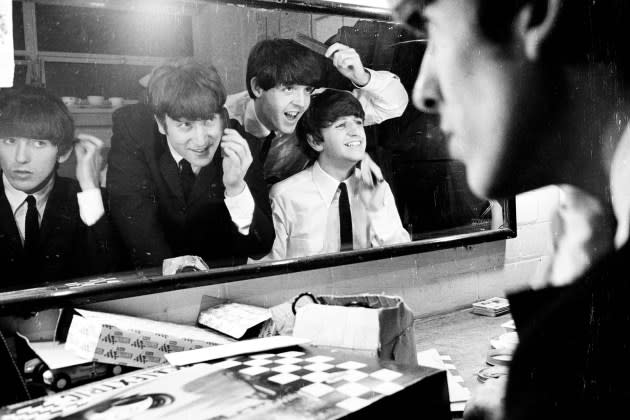Paul McCartney, Ringo Starr & Ron Howard Sit Down for Hilarious, Heartfelt Chat About Beatles Touring Years Ahead of New Documentary ‘8 Days A Week’
- Oops!Something went wrong.Please try again later.
- Oops!Something went wrong.Please try again later.
- Oops!Something went wrong.Please try again later.

As the 50th anniversaries of various events from The Beatles’ career roll on, finding a fresh take is a formidable challenge. But for The Beatles: Eight Days a Week — The Touring Years — which combines archival footage, fan-generated clips and the band members’ personal reels spanning from 1962 to the group’s last concert in 1966 — Oscar-winning director Ron Howard (A Beautiful Mind, Apollo 13 and a star of ’70s sitcom Happy Days) found an unexpected angle as he dug into the project.
“I began to see this time frame was a brilliant idea: It could be an adventure-ensemble survival story,” says Howard. “I could put my Apollo 13 narrative mind-set to work.” Billboard spoke with Howard and former Beatles Paul McCartney and Ringo Starr about the film, which opens wide in theaters Sept. 16 and streams on Hulu the following day.
More from Billboard
Billboard Women in Music Legend Loretta Lynn: 'Call Me Your No. 1 You-Know-What-Kind-Of Stirrer'
'Thar's Gold In Them Sideburns': What Billboard Wrote About Elvis Presley Back In the Day
When did you all first meet?
Starr: I met Ron in the ’70s, when he was a lad and I was a lad.
Howard: He and [Who drummer] Keith Moon wandered onto the Happy Days set. I’m not kidding.
Starr: We thought we could be in it!
Howard: Everything stopped and the assistant director tried to keep rehearsal going, but [co-star] Henry Winkler and I said [to the AD], “Get the f— out of here! We’ll catch up later!” [Then to Starr and Moon]: “Anyway, how are you guys?”
Starr: Actually, we were lost.
Is there anything in the new film that you truly cannot remember?
McCartney: Quite a bit of it.
Starr: And that’s just from last week.
McCartney: One of the things was seeing yourself as The Beatles. In the end you kind of become a fan — “Bloody hell, they’re great!” Then you sit back and realize that’s you. It’s hard to take in.
What’s it like to watch from the outside versus living it?
Starr: Well, you’re looking at a movie, aren’t you? A movie of the life we led. It’s great to look at it because you can relax now. There’s a lot of life gone by and a lot of memories.
The film often mentions the poor sound quality of the concerts. How did you handle that?
Howard: That’s part of what was exciting about taking on the project: what could now be done digitally to enhance the experience for the audience. I knew we could improve the images, bring more detail. I wanted to make the concerts as watchable and as exciting as possible.
What surprised you most while making the film?
McCartney: Some things that came out of it, like … We loved black music and black artists, and [we would only perform] if there was no segregation [which still existed at concerts in the South in the 1960s]. But I was surprised to see that it was in the contract.
Are there plans to continue the history with other projects?
McCartney: We didn’t know this project was coming. That’s the great thing: We love that things keep happening. Once, we were going from London to Liverpool in a terrible snowstorm — you couldn’t see the road. The van skidded down the embankment, and there was no way to back up. We’re standing around, the four of us. Somebody said, “Something will happen.” That is now my mantra. Sure enough, we got a lift.
This article originally appeared in the Sept. 17 issue of Billboard.
Best of Billboard
